|
|
|
Sort Order |
|
|
|
Items / Page
|
|
|
|
|
|
|
| Srl | Item |
| 1 |
ID:
142340
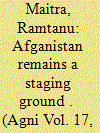

|
|
|
| 2 |
ID:
172050
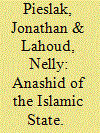

|
|
|
|
|
| Summary/Abstract |
This article examines the rise of the Islamic State (IS) through its anashid (a cappella), analyzing their lyrics and their musical attributes such as sonic elements, pitch, and harmony, among others. It focuses on key themes that define the group's lyrics and traces the evolution of anashid production and use—an evolution that began with the IS borrowing existing jihad-themed anashid to articulate its message and accompany its video messaging, and led to a far more developed and sophisticated sonic identity in the form of internally produced, group-specific anashid. The IS's claims to legitimacy as the caliphate are sounded out in the group's anashid. The recurring appearance of propaganda in the form of anashid and videos builds a strong case for the genre's significance among the highly complex factors catalyzing an individual's involvement in carrying out violence, especially among recent attacks within Western countries in the name of IS.
|
|
|
|
|
|
|
|
|
|
|
|
|
|
|
|
| 3 |
ID:
142937
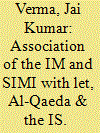

|
|
|
| 4 |
ID:
164150
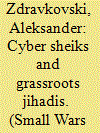

|
|
|
|
|
| Summary/Abstract |
What was the scope of the Bosnian jihadi participation in the war in Syria? Did the Bosnian volunteers tend to join one particular faction? Why did the Bosnian youngsters decide to join the holy war in the Levant? Was this an organized and hierarchical process or was this a grassroots movement? Last, were all the Salafis in Bosnia supportive of this dynamic or did this process cause internal frictions? These are some of the questions that this research will try to answer.
|
|
|
|
|
|
|
|
|
|
|
|
|
|
|
|
| 5 |
ID:
191866
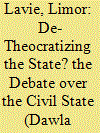

|
|
|
|
|
| Summary/Abstract |
Since the Arab uprisings, the ambiguous notion of a civil state (dawla madaniyya) has been gaining a foothold in many Arab states as the ideal state model, at the official and popular levels. Even Saudi Arabia has heard voices advocating a civil state. Whereas such voices were evident in critical newspaper columns, which raised countercriticism by the Saudi religious orthodoxy during the 2000s and 2010s, recently Crown Prince Muḥammad bin Salmān Āl Saʿūd has been increasingly portrayed in the Saudi media as directing the Kingdom toward a modern Islamic civil state, indicating a possible change in the perception of this concept. This article offers a contextual analysis of the Saudi intellectual polemic on the civil state model, which has been taking place for the past fifteen years, its development, meanings, and prospects. The article will also consider the implications of the long-standing debate over the civil state idea taking place in Egypt on the short-lived Saudi contestation, in an effort to enhance the overall understanding of the conception of the civil state in the Arab world.
|
|
|
|
|
|
|
|
|
|
|
|
|
|
|
|
| 6 |
ID:
144967
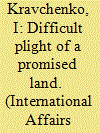

|
|
|
|
|
| Summary/Abstract |
ANY NATIONAL CRISIS tests a country's political system, exposing its latent vices and vulnerabilities. European countries have been plunged into such crises when, after times of affluent, carefree existence, they were spontaneously inundated by refugees from conflict-stricken areas in the Middle East and North Africa. One wonders, though, whether this flood of newcomers was spontaneous at all - too sudden to come from nowhere, it has had clear causes, the flows of refugees have had specific destinations and appear to have followed specific transit routes.
|
|
|
|
|
|
|
|
|
|
|
|
|
|
|
|
| 7 |
ID:
139519
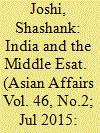

|
|
|
|
|
| Summary/Abstract |
This article traces the outlines of India's engagement with the Middle East, focusing on security-related aspects of that engagement. First, it argues that India's approach towards the Middle East has undergone less transformation than that seen in Indian policy towards other key regions, notably the United States and Asia. Second, it describes how India has responded to recent, and older, episodes of political disorder in the region, and what patterns might be identified from these. Third, it traces aspects of India's relationships with Iran and Saudi Arabia, an exercise that brings some of those patterns into sharper relief. Fourth, and finally, the paper concludes by asking how India might orient itself in the region in the future.
|
|
|
|
|
|
|
|
|
|
|
|
|
|
|
|
| 8 |
ID:
143116
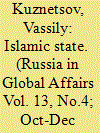

|
|
|
|
|
| Summary/Abstract |
In the last year, an alternative model of statehood for the Middle East region has become a widely discussed topic. While the ideas of various alternative projects appeared quite often in the 20th century (in connection with the establishment of the State of Palestine, the Kurdish problem, the Third International Theory of Muammar Gaddafi, etc.), they occupied a marginal place and hardly ever came close to realization (it will suffice to recall the idea of democratic confederalism by Abdullah Ocalan). However, the rapid strengthening of the Islamic State (IS) and its exoticism seem to create the impression of a sudden emergence of a real alternative.
|
|
|
|
|
|
|
|
|
|
|
|
|
|
|
|
| 9 |
ID:
170854
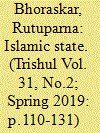

|
|
|
| 10 |
ID:
175735
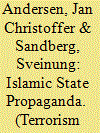

|
|
|
|
|
| Summary/Abstract |
The Islamic State (IS) has become notorious for violent, brutal actions and the presentation of these actions in social and mainstream media. Excessive violence creates a spectacle for the news media. However, IS propaganda also emphasizes its role in state building and its engagement in social and welfare work. This twofold propaganda enables the mobilization of different audiences, but it also sends conflicting messages about the organization. In this article, we study the e-magazine Dabiq, emphasizing its methods of gaining support and attempting to recruit Western participants to violent jihadism. We use theories of social movement and subculture to reveal some of the underlying tensions in IS’s communicative strategies. The analysis first identifies how IS frames its propaganda, attempting to mobilize widespread support. Then, it highlights another dimension of IS’s rhetoric: provocations, the creation of sensationalist spectacles of violence and links to excitement seeking, stardom, and popular culture. We conclude that combining general anti-Western rhetoric and religious imagery with extraordinary depictions of violence has been both a strength and flaw in the organization’s propaganda.
|
|
|
|
|
|
|
|
|
|
|
|
|
|
|
|
| 11 |
ID:
147599
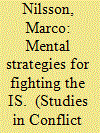

|
|
|
|
|
| Summary/Abstract |
This study analyzes the war against the Islamic State (IS), specifically on the front in northern Iraq, and the mental strategies that the Kurdish Peshmerga soldiers use to maintain their combat motivation. For this field study, dozens of soldiers of various ranks were interviewed and observed on three fronts outside of Mosul, Erbil, and Kirkuk in February 2014. While some mental strategies are nearly universal, others depend on the characteristics of the fighting force and the threat that they face. The article identifies five distinct mental strategies for dealing with the stress of fighting the IS: simultaneous dehumanization and humanization of the enemy, seeing a larger cause, use of humor, religious identity, and martyrdom. The findings suggest that factors beyond primary group cohesion, on which much previous research has focused, can play an important role in increasing soldiers’ fighting power.
|
|
|
|
|
|
|
|
|
|
|
|
|
|
|
|
| 12 |
ID:
146310
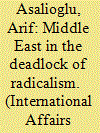

|
|
|
|
|
| Summary/Abstract |
RADICAL GROUPS have always exploited, and continue to exploit, religion, ethnicity, ideology, and lack of education to sustain their influence. Radicalism deforms social environments in which it emerges. As a result, radical terrorist organizations existing in a specific society interact not only with one another. They do not only create their own social base but help build the social base for a political opposition, thereby setting off significant social transformations. Studies by the Pew Research Center show that radicalization and extremism, including the activities of al-Qaeda, Hamas and Hezbollah, caused more concern in the Middle East in 2014 than in 2013, that there is particularly strong concern in Turkey, and that extremism is a source of worry for the majority of Middle Eastern nations.
|
|
|
|
|
|
|
|
|
|
|
|
|
|
|
|
| 13 |
ID:
160976
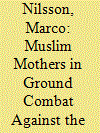

|
|
|
|
|
| Summary/Abstract |
This study analyzes the experiences and identities of Kurdish women fighting the Islamic State (IS) in northern Iraq as part of the Peshmerga Army. The case is especially interesting because these women have engaged in ground combat and because there is an empirical gap in knowledge, especially concerning Muslim women’s experiences as soldiers. Wars bring great destruction but can also catalyze social change. While seeking balance between their identities as good mothers and professional soldiers, many Kurdish women see their war participation as a chance to increase their agency and improve equality in society, as combat operations create a window of opportunity to change perceptions of women’s roles. Women soldiers still face prejudices and feel that they must prove their worth as fearless warriors in ground combat. However, interviewed soldiers said that they were not striving for equality but equivalency, stressing those qualities that women in particular can contribute in battle.
|
|
|
|
|
|
|
|
|
|
|
|
|
|
|
|
| 14 |
ID:
147934
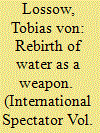

|
|
|
|
|
| Summary/Abstract |
The so-called Islamic State (IS) has increasingly used water as a weapon in order to further its political and military aims in Syria and Iraq. In this water-scarce region, IS has retained water and cut off crucial supplies, flooded large areas as well as contaminated resources. The capture of large dams in the Euphrates and Tigris basin has made it possible to deploy the water weapon even more effectively and in a frequent, systematic, consistent and flexible manner. Measures to counter this weaponisation effectively have been limited to military means. However, several internal constraints create a dilemma for IS as its state-building ambitions conflict with the consequences of the weaponisation of water. The rebirth of using the water weapon in Syria and Iraq raises questions about protecting water infrastructures in conflict and post-conflict settings.
|
|
|
|
|
|
|
|
|
|
|
|
|
|
|
|
| 15 |
ID:
156915
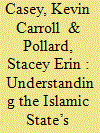

|
|
|
|
|
| Summary/Abstract |
While many researchers have examined the evolution and unique characteristics of the Islamic State (IS), taking an IS-centric approach has yet to illuminate the factors allowing for its establishment in the first place. To provide a clearer explanation for IS’s successes and improve analysts’ ability to predict future occurrences of similar phenomena, we analyze IS’s competitive advantages through the lens of two defining structural conditions in the Middle East North Africa (MENA): failure of state institutions and nationhood. It is commonly understood that the MENA faces challenges associated with state fragility, but our examination of state and national resiliency shows that Syria and Iraq yield the most deleterious results in the breakdown of the nation, suggesting that the combined failure of state and nation, as well as IS’s ability to fill these related vacuities, is a significant reason IS thrives there today. Against this backdrop, we provide a model of IS’s state- and nation-making project, and illustrate IS’s clear competitive advantages over all other state and non-state actors in both countries, except for Kurdish groupings. We conclude with recommendations on how policy-makers may begin halting and reversing the failure of both state and nation in Iraq and Syria.
|
|
|
|
|
|
|
|
|
|
|
|
|
|
|
|
| 16 |
ID:
138033
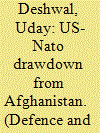

|
|
|
|
|
|
|
|